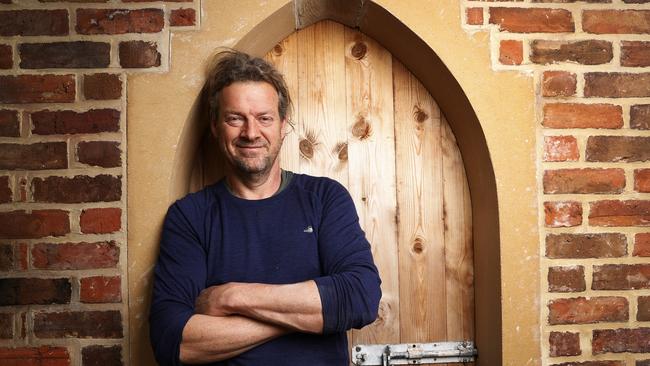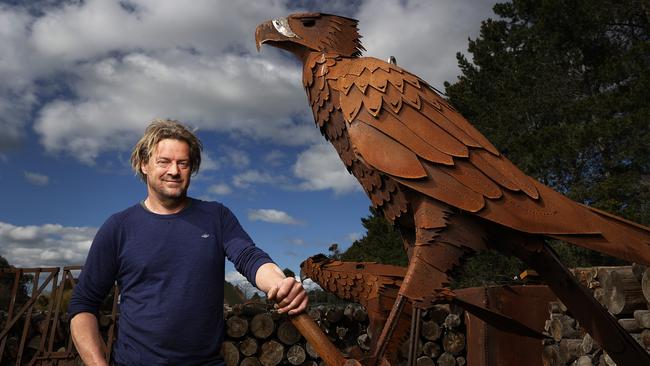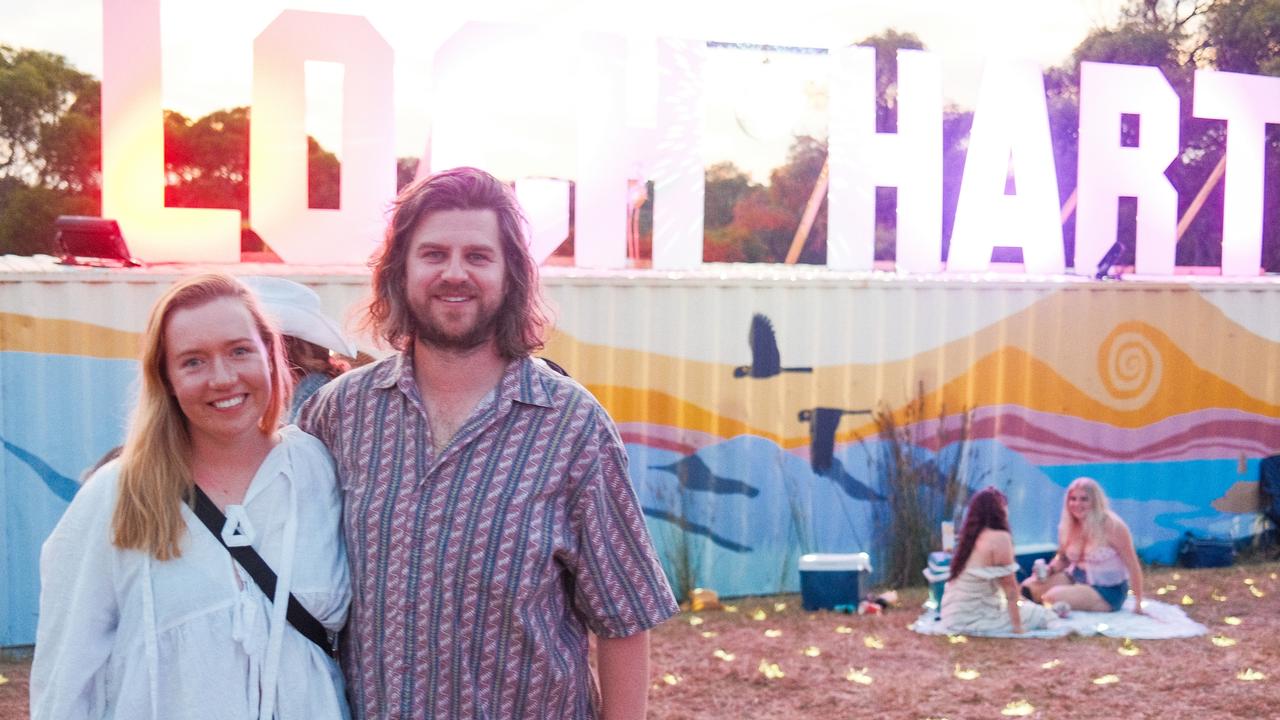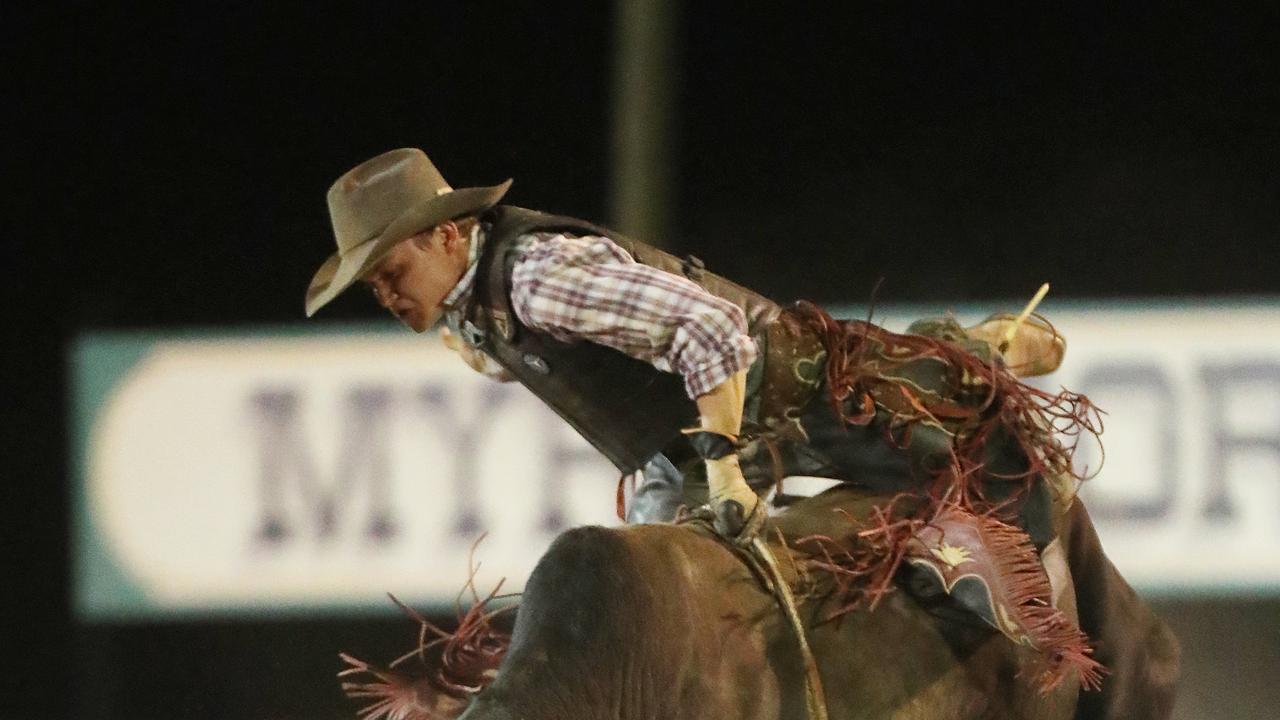Tasmanian Folko Kooper’s garden sculptures from steel, glass, bronze, stone
From his convict-era Tasmanian property, sculptor Folko Kooper makes exclusive garden sculptures out of steel, glass, bronze and stone.

FROM his shed, Folko Kooper looks out across his 13ha Tasmanian property to a convict-built stone wall, a forest of oak trees planted in the 1860s and his sprawling sculpture garden.
Nearby is the home he shares with wife Maureen Craig — an elegant 1830s Georgian manor, straight out of the pages of Vogue Living.
Inside the shed, however, it’s a different world, with the tools of the sculptor’s trade including angle grinders, plasma cutters and heavy duty MIG welders.
“Our life here is very contemporary, but in an old setting,” Folko says to explain the contrast of old and new.
“In some ways we lead a dream life, living and working from a beautiful spot, but we can only do it because we work hard and we’re disciplined.”
Since 2002 the couple have lived on the property, Oakwood, in Mangalore, Tasmania, one of the earliest colonial settled areas in Australia. “Because of Aboriginal fire management, this area was meadows at the time of settlement and so sheep farmers moved here early on. We lived in a series of Georgian houses.”
It is the perfect location for Folko to make his one-off garden sculptures and water features, made out of corten/mild steel, glass, bronze, stainless steel and stone.
“We have a boundary line of radiata pines planted in the 1850s which acts as a buffer zone to stop all the noise and banging to the neighbours,” the 57-year-old adds.
Aside from allowing Folko the freedom to work, the property also doubles as a sculpture park, open by appointment only to clients.
Here they can explore the gardens and view about 70 of his pieces, which are sold around Australia and overseas to mainly private customers, but also commercial buyers such as housing developers.
Folko is best known for his bird baths, made from a combination of materials including stone or steel plinths, glass bowl, with bronze birds including parrots, kingfishers or wrens.
Other signature pieces include a 1m steel cockatoo mounted on a split timber fence with a plough disc at the bottom.

His abstract light sculptures are also sought after, made in spheroid shape from stainless steel.
“I make sculptures that are visually pleasing and look nice in a garden. I’m not trying to send a message or be confrontational,” he explains.
“To me it’s about having a sense of balance and keeping colours natural. I don’t want the pieces to dominate a garden, but enhance it so I don’t colour the glass, and use a lot of rusty browns and stone.”
Folko grew up in the Netherlands, but moved to Australia with his family as a 16-year-old.
It was while he was working as a chef in Sydney — a job he had for 15 years — that he began dabbling in carving ice sculptures and butter creations for the buffet, then moving into stone work.
For about eight years the sculpting grew into a hobby, becoming full-time when he moved to Tasmania in 1996.
Folko is essentially self-taught, only completing a short course in stone carving, adding that he has always been “handy” with a natural flair for art.
While he makes the designs, moulds, welding, carving and composition, Folko outsources some of the work including glass slumping, bronze casting at a foundry and exact steel fabrication.
“My steel work is free form. No matter how much I concentrate and focus I can’t make a precise right angle.”
Given the material used, sculptures are not light, although not so heavy customers can’t move them with a trolley.
In the shed, Folko uses a tractor with a fork to move pallets and lifting devices with an overhead gantry for haulage.
“I’m generally grumpy if I don’t get on my tractor at least once a day,” he says.
Sculptures start from $2500 and he adds that he’s constantly evolving his designs to keep ahead of copycats.
Surprisingly COVID-19 has not slowed business. While the biggest event on his calendar is the annual Melbourne Flower and Garden Show, the pandemic has boosted sales.
“In the beginning there was a slump, but I think because people were sitting at home they wanted something for their gardens and landscape designers have been very busy.”
When he’s not in his shed, Folko heads into the garden, where he and Maureen have an olive orchard, making about 100 litres a year of oil, as well as their apple orchard, with 100 heirloom trees to make their own cider.
“We do pinch ourselves every day because we appreciate where we’ve ended up.”
MORE
BROTHERS’ DEATHS REMEMBERED THIS ANZAC DAY


